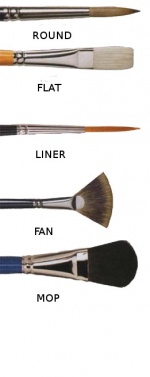AY Honors/Painting/Answer Key
Template:Adventist Youth Honor Answer Book/Notes/Drawing and Painting
1. Have the Basic Drawing Honor
For tips and instruction see Drawing.
2. Create a Color wheel using crayon or color pencil. Include and understand:
a. Primary Colors
RED, BLUE, YELLOW
b. Secondary Colors
mix P + P = ORANGE,GREEN,PURPLE(Violet)
c. Tertiary Colors
mix P + S = YG,GY,GB,BG,BV,VB,VR,RV,OR
d. Neutral Colors
BLACK AND WHITE (GRAY)
e. Warm/Cool Colors
R,Y,O,YG // B,G,P,RV
f. Tints
any color + white
g. Shades
any color + black or it’s complement
h. Complementary colors
colors that are opposite each other on the color wheel.
3. Create a Value Scale of a warm and a cool color, using color pencil.
4. Name seven (7) color media.
- Oil paint
- Conte Crayon
- Acylic paint
- Guache
- Water Color paint
- Charcoals
- Tempera paint
- Inks
- Color pencils
- Crayon
- Pastels -chalk and oil sticks
5. What is the difference between water based and oil-based paints? Name 2 of each type.
Water based paints: such as water colors, Acrylics and Tempera, have a water base and wash up with soap and water. Oil based paints: oil paint and oil pastels, have a base of oil and must use mineral spirits or turpentine to wash up brushes and tools.
6. What paint medium was made with egg yolk?
Tempera
7. Define the following and tell how they are used:
- a. Gesso
- a medium painted on canvas before painting to seal the canvas and help the paint to spread and blend better.
- b. Masking fluid (Miskit)
- a substance painted on paper where you want it to stay white; then is erased.
- c. Mineral Spirits/Turpentine
- used for cleaning brushes of oil paint
- d. Palette
- a hard surface for laying out and mixing paint
- e. Easel
- an upright frame to hold canvas on for ease of painting; Supports what you paint on: paper, canvas, canvas board, Masonite board, glass, etc.
8. Describe what the following brushes are used for:
a. Rounds
under-painting, washes, rough lay-in, details
b. Flats
loose style, long flexible hairs carry large loads
c. Liner Brush
detail work
d. Fan Brush
soft blending, dry-brush blending, foliage, evergreens
e. Mop Brush
washes, dry brush blending, light body paint, watercolor and inks.
9. What is the best way to care for paint brushes?
Wash out under cool water until water runs clear. Shake out excess water and re-shape bristles. Allow to dry bristles up. For oil base paints do the same using mineral spirits or turpentine product instead of water.
10. Describe and be able to explain the difference between:
a. Realistic Art
Looks life-like and natural; easily recognize subject
b. Abstract Art
Not realistic, may or may not be recognizable
11. Know the difference and show examples of the following subject matter:
a. Portrait
A person and / or animal; usually head & shoulders
b. Landscape
Picture of the land, cityscape or seascape
c. Still Life
Non-living, not moving
d. Abstract
Not realistic, may or may not be recognizable
12. Draw and paint, in your choice of color media, a still life or floral subject.
13. Paint a landscape showing linear perspective.
14. Paint a portrait of a friend and/or favorite pet from a photo.
15. Memorize Psa 19:1. Discuss how this text inspires your Artwork.
“The heavens declare the glory of God; and the expanse proclaims His handiwork.”

